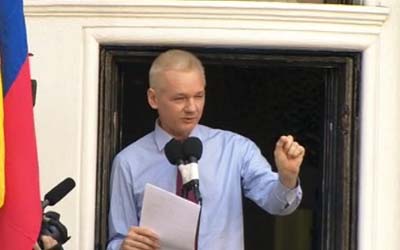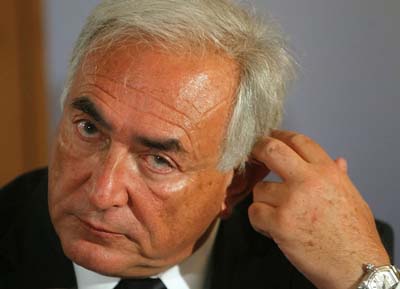Another Assange-o-rama saga: Run, run, run away
It was a rather depressing start to what should have been a festive day.
Sunday kicked off at the office with deadly blasts in Libya, a plane down in Sudan, an attack on a policeman’s funeral in Ingushetia and deadly assaults during Eid prayers across Afghanistan. “Eid Mubarak,” I muttered, since it was the Muslim feast. Things couldn’t get worse.
But we hadn’t yet struck the low point of the news day.
That came, as promised, when tirelessly self-promoting WikiLeaks founder Julian Assange got his Eva Peron moment on the balcony of the Ecuadorian Embassy in London.

“He’s spinning us, goddamit,” I grumbled as I was forced into breaking news mode, unable to ignore another scripted story. In this business, you may disagree with the news, but sometimes news is news – even if it’s scripted - and you have to cover it.
And scripted it was, from start to finish.
Days in advance, we were told that Assange would make a statement Sunday at around 1400 GMT. It was just enough notice for news organizations to dredge out the “will he be arrested if he puts his pinkie out of the embassy?” story.
So, after a morning of “Julian Assange to make public statement” stories, the appointed hour arrived and the latest Assange-o-rama saga unfurled, live, before the TV cameras.
The much-awaited statement bore all the self-absorbed, delusional flourishes we have come to expect from the newest self-declared messiah on the [embassy] blok.
There were plenty of oratorical pauses, which supporters outside the London building obediently filled with worshipful “Yeahs” and applause. Then came a couple of dark references to darkness - “after dark, I could hear teams of police swarming up into the building” followed by “vigils in the dark” and “citizens whispering in the dark”. Finally, the slogan-perfect, the US “must renounce its witch-hunt” moment.
Now you might be forgiven if you think this is all about the US going after Assange. As Raffi Khatchadourian wrote in his insightful July 2010 New Yorker profile, the USA has always been Assange’s favourite bogeyman and the 41-year-old Wikileaks founder has been adept at pinning it all down to the dark empire.
Sweden as a US attack dog
But the current Assange saga is not about the USA. It’s about sexual assault allegations against him in Sweden of course.
When I try mentioning this to many of my friends and colleagues, I’m invariably brushed aside. It’s all about the USA, they solemnly intone. Obviously Washington is using Sweden to secure Assange’s extradition to the US. In other words, Sweden is the USA’s attack dog.
Sweden, we are darkly told (darkly, always darkly) has an extradition treaty with the US.
But then so does the UK. There are certainly widespread calls in the UK for an overhaul of that 2003 treaty, but the fact remains that the US and the UK share extradition agreements, which is hardly surprising given the close relations between the two countries.
Assange has been in the UK for over a year, ample time for the US government – or even private US citizens – to file charges against him in the US courts and kickstart extradition proceedings, if they really wanted him.
Sweden does have an extradition treaty with the US, but the process of extradition is long and very complicated. So far there is not even a charge against Assange in the US, which makes a long process even longer.
Tried explaining this too to a number of my friends and colleagues and the explanations I get range from the absurd to the seriously delusional. “The Brits” would not stand for it, so the US government “won’t go there” – enter the Sweden as attack dog theory. Another theory is that the US does not want to “embarrass” the British authorities.
Ah, to spare the British authorities the embarrassment. Like anything can top the current silly-fest around that red brick building in London’s upscale Knightsbridge neighbourhood.
Those silly little sexual assault whines
At the heart of the matter are those sexual assault allegations against Assange by two Swedish women.
Now most sexual assault cases are “he said, she said” affairs that are complex and tricky to prosecute. But how many times have sexual assault allegations by women against powerful or popular men been dismissed as politically motivated? Oh your silly little sexual assault whines when there are so many important political issues at stake.
Just this morning, my Parisian taxi driver, who was of Congolese origin, was ranting about how the Dominique Strauss-Kahn (DSK) sexual assault case was a conspiracy against the former IMF chief by his French political opponents.

I heard him out until I reached the office building and then snapped. “Monsieur, DSK is a very rich man and today, he is a free man. If you ever hear of a poor, immigrant woman in France – it could be your daughter, it could be anyone – winning a sexual assault case against a rich, powerful Frenchman, you know where I work, just contact me because THAT’s a story.”
Freedom-hating Sweden, freedom-loving Ecuador
The Swedes of course are fuming about Assange’s witch hunt-like portrayal of their nation.
In August 2010, Assange applied for a residence permit to live and work in Sweden because of the country’s laws protecting whistle-blowers.
Now Assange is in the glorious state of dumping on Sweden to find an ally in Ecuadorian President Rafael Correa who, turns out, has “one of worst track records on press freedom in the Americas”.
A word about those leaked US cables. For the record, I’m a huge fan of those leaked cables. Whether I’m covering Mali or Tunisia or places in-between, I often refer to those cables and they’re so absorbing and fascinating, I have trouble getting back to my story on deadline.
They’ve provided me information, background, colourful incidents, biting insights and they’ve also convinced me that some US diplomats are far better writers than journalists. One thing they haven’t provided me though is anything new.
Some of Wikileaks’ latest leaks are almost embarrassing – like the Stratfor email leaks that described the subscription-based analysis provider as a “private CIA”. In his masterful Foreign Policy piece, “How WikiLeaks Blew It,” Joshua Keating accused Assange and WikiLeaks of “overpromising on leaks the site can't deliver”.
The crux of the Assange-o-rama though, is that his organization, Wikileaks, has been hijacked by the delusional saga of one man - the “crazy white-haired Aussie” as ¨Private Bradley Manning once called Assange.
Bradley Manning, the US Army soldier whistleblower at the heart of Cablegate. Now that’s one guy the US government is after since Washington is determined to nip any future military whistleblowing dreams in the bud.
Private Manning is the one who’s really roasting. But the Wikileaks saga is now all about Julian Assange’s David-like fight against a Goliath Obama, not about Manning.
To be fair to Assange, he did call for Manning’s release in his balcony speech. But then he went on to compare his case to Bahraini activist Nabeel Rajab (who I deeply admire) and Russian band, Pussy Riot.
But then again, Rajab is a human rights activist taking on a repressive Sunni monarchy that is crushing its majority Shiite subjects. The Pussy Riot trio is questioning the legitimacy of President Vladimir Putin’s re-election and exposing the cozy relations between the Kremlin and the Russian Orthodox Church.
I’m still scratching my head trying to determine the similarities between Pussy Riot, Nabeel Rajab and Assange. Private Manning will once again have to wait.




14 Comments
Less is more, more or less
Post new comment